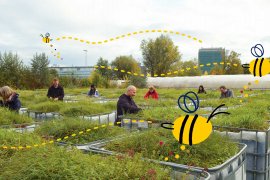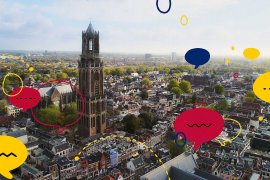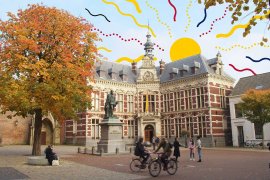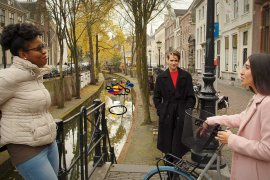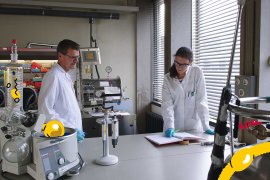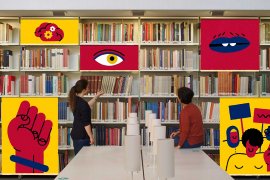University College Utrecht
University College Utrecht is an academic community committed to a Liberal Arts and Sciences (LAS) education.
Jump to:
Profile
University College Utrecht distinguishes itself, also from many other LAS programmes, in three ways. First, it invites students to a largely open curriculum that allows each student to craft their own unique combination of courses and disciplinary specialisations across the full range of academic fields – from the natural sciences, to the social sciences and the humanities. This is complemented by a range of multi- and interdisciplinary courses notable for their creativity and their engagement with some of the most significant challenges our societies face today: from digital citizenship to African postcolonialism, from the plasticity of the brain to the nature of order and chaos. This ‘open curriculum’ is held in place by a dedicated group of tutors, who not only guide students through the curriculum but are deeply committed to mentoring students as individuals undergoing what will be some of the most dynamic years in their lives.
The second distinguishing characteristic of UCU is that it is a close-knit residential college in which the academic buildings literally nestle between (as well as themselves house) students. Learning and living suffuse one another, even as living together as a community is an integral and necessary component of UCU’s educational philosophy. Engaging each other as a social community (rather than just a ‘student body’) enables students to truly learn together, including through their sometimes significant intellectual, personal and philosophical differences. At the same time, UCU functions as a community for its faculty and staff members as well, making them strikingly passionate at the pedagogic and organisational levels.
Both a global and local awareness are fundamental to the culture of UCU.
Third, UCU is an international community, with students from scores of countries, an enviable and extensive exchange programme and internationally oriented faculty and staff. Its ‘mixed classroom’ and multilingual living units foster language awareness, intercultural communication and cooperation, and an engagement with multiple forms of diversity. At the same time, students’ academic projects, off-campus studies, work, sports, volunteer and leisure activities extend well beyond the campus into the city of Utrecht. In this fashion, both a global and local awareness are fundamental to the culture of UCU.
The intent of the education offered at UCU is to ‘not only enable personal growth and professional advancement, but also prepare our students to fulfil their role as citizens.
In all of this, UCU is committed to contributing to a ‘better world’. As the UCU Mission Statement emphasises, the intent of the education offered at UCU is to ‘not only enable personal growth and professional advancement, but also prepare our students to fulfil their role as citizens, enabling them to serve others in a range of different roles.’
These strengths and ambitions at University College Utrecht reinforce this strategic plan. As such, the plan seeks to support and complement the goals set by Utrecht University’s overarching strategy for the coming five years in a manner consistent with UCU’s distinctive character and qualities. Like the UU, UCU must do so by responding effectively to increasing calls for societal ‘relevance’. It must show consideration for the work pressures of students, faculty members and support staff alike, and it must strive to become a community that much better reflects the diversity of our societies and world.
At the same time, the college harbours aspirations more particular to itself, including those of:
- safeguarding UCU’s distinctiveness amidst the rise of other ‘broad’ bachelor’s programmes;
- strengthening UCU as a hub of educational innovation both in- and outside Utrecht University, with particular attention to the dynamic between rigorous disciplinarity and creative multi- and interdisciplinarity;
- putting environmental, social and political sustainability – as anchored in the UN Sustainable Development Goals – at the heart of UCU’s campus, curriculum, scholarship and culture;
- reinventing the college’s residential campus concept in light of an anticipated relocation from the International Campus shortly after the end of this strategic plan (2025).
In striving to achieve this, UCU currently faces a number of challenges that will significantly shape the process and scope for implementing these goals. These include a structural budget shortfall for which a durable financial solution needs to be found; the normalisation of structural overwork by faculty and support staff that plagues UCU just as much as it does other Dutch universities; the time and effort it will take to consolidate the recent reorganisation at the day-to-day level; the effort, energy and creativity that relocating the campus will require; and the profound effects of the COVID-19 pandemic on the physical and mental health, work load, and the pedagogical and personal environments of UCU community members.
UCU aspires to recognise the talents of all its members.
In responding to these conditions, UCU affirms its commitment to community, human well-being, and global justice. It is a college that aspires to recognise the talents of all its members, with an organisational structure and culture that reduces needless stress and promotes openness, and by a kind of teaching and learning that focuses as much as possible on the deepest needs of students and faculty. At the same time, UCU is seeking to increase its involvement in society, from a focus on specific Sustainable Development Goals, to contributing to open science and participating in various forms of Community Engaged Learning and Research. In pursuing these aims, it hopes to creatively deepen and expand its embodiment of its Liberal Arts and Sciences mission.
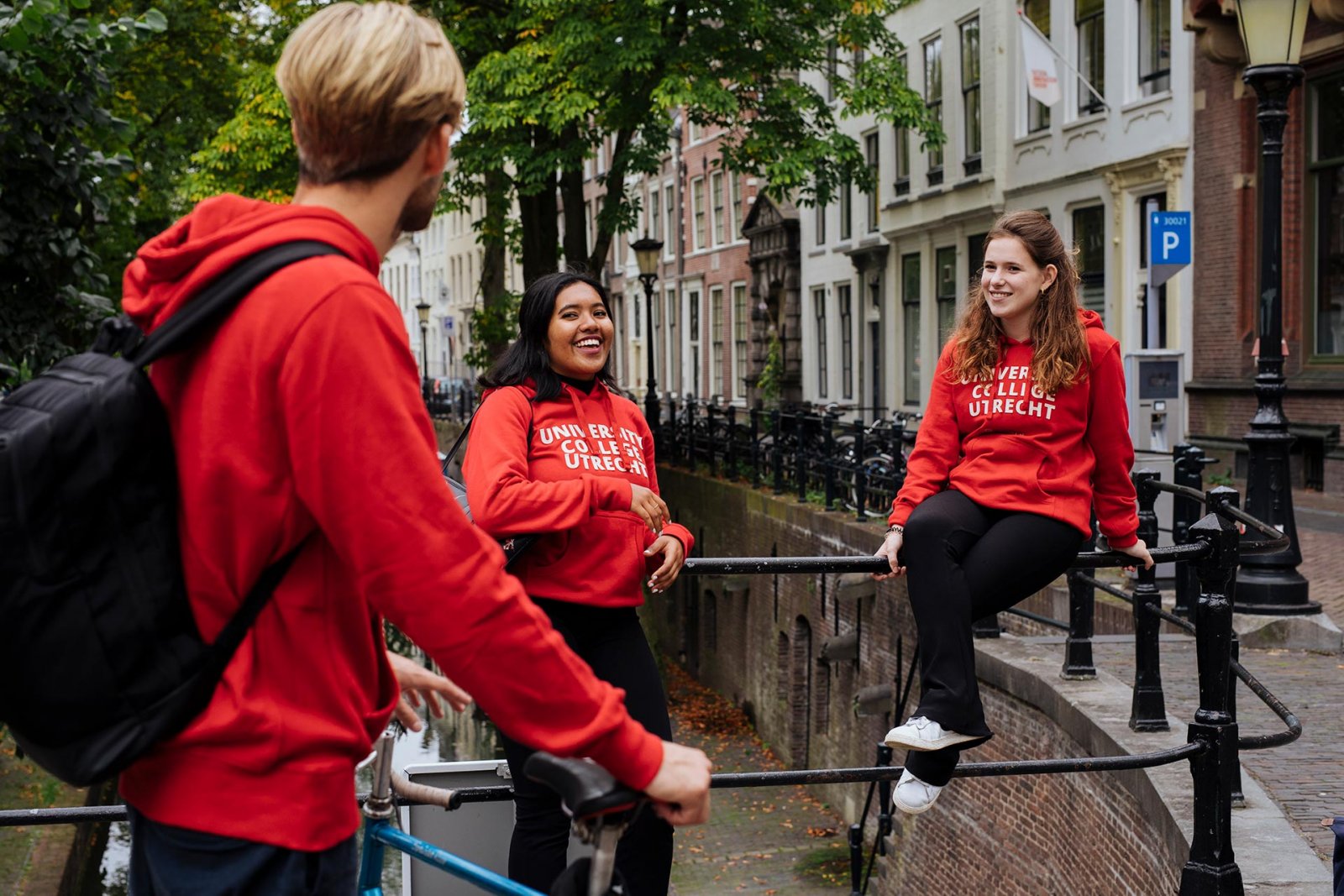
Education
Educational philosophy
UCU will remain committed to its ‘open’ and tracks-based curriculum. At the same time, UCU will be undertaking a comprehensive revamping of its curricular offerings in close consultation with different UCU stakeholders. The outcome of this curricular renewal will entail maintaining and strengthening disciplinary rigor while expanding UCU’s multi- and interdisciplinary programme. The point will be to offer courses that are both meaningful to students’ lives and incorporate cutting-edge scholarship.
More broadly, it will result in a comprehensive vision for UCU of what a contemporary Liberal Arts and Sciences curriculum should look like. The new Cluster Chairs (see paragraph Organisation) will play a critical role in this regard. They will work closely with each other, with the Director of Education, with the Fellows and Instructors within their own multidisciplinary Clusters and with the Educational Programme committee of the UCU Council. The outcome will consist of innovative co-creations that build on existing tracks, courses and collaborations. Particular attention will be given to the following:
- strengthening and expanding UCU’s interdisciplinary offerings while creating new (multi-)disciplinary capstone projects engaging large questions and challenges, with particular a ttention to the third year, but also extending downward to the second and first year;
- attending specifically to the visibility, coherence and vital contribution of the Sciences at UCU as a critical component of UCU’s Liberal Arts and Sciences identity and programme, as well as a central component to addressing global challenges that range from climate change to pandemics, and from nuclear weapons to value pluralism;
- stimulating increased UCU-UU collaborations, including through embedding sustainability in UCU’s teaching and scholarship – where sustainability is conceived in environmental, socioeconomic, and political terms corresponding to the SDG goals set out by the United Nations;
- initiating a discussion at UCU, including a wide range of faculty members, students and support staff, on the possibility of making ‘decolonising the curriculum’ an element of the renewal of UCU’s liberal arts and sciences programme more broadly – as this may include both attending to the role of colonialism and imperialism in shaping modern arts and sciences, as well as implementing innovative decolonial courses, projects and events;
- intensifying students’ research experience from the first year, in order to strengthen their preparation for the thesis and for subsequent MA programmes. This could be achieved through a range of initiatives, including by more directly relating the content of methodology courses to other courses; implementing the ‘Research Clinics’ recently approved by the Board of Studies; expanding the possibilities for laboratory experience by science students; and increasing the integration of faculty scholarship into UCU courses;
- expanding and profiling UCU as a platform for Community Engagement through courses, projects, theses and internships, as well as by making Community Engagement a desired element of students’ UCU experience;
- exploring possibilities for dynamically combining capstone and community engagement projects with the thesis – for example, by offering two thesis variants, one of 15 ECTS (as currently) and one of 7.5 ECTS;
- organising annual retreats – including faculty, support staff and students – on the subject of teaching and learning in a Liberal Arts and Sciences education.
In all of this, the purpose of a Liberal Arts and Sciences education should be a returning point of discussion. We should focus most of all on enabling learning and teaching that is meaningful to all involved. In doing so, UCU community members should have the full range of UCU’s resources at their disposal to give shape to such teaching and learning in the most creative, challenging and rewarding fashion.
Our residential community
As the college explores and develops an alternative location, the key elements of success brought by the current campus must be maintained. The physical entanglement of living and educational spaces is key to students’ experiential learning. This occurs in an architectural setting whose visual power and spatial relations shape all aspects of campus life. Scholarship, learning, socialisation and intellectual growth take place within a physically bounded space that is also very much a social, intimate and personal place. The college will pursue and develop location options that safeguard these necessary conditions.
As the college explores and develops an alternative location, the key elements of success brought by the current campus must be maintained.
One of the prime concerns in UU’s decision to relocate UCU was the issue of sustainability. UCU correspondingly commits itself to seeking to re-imagine itself at a new location in which sustainability is a central identifying feature of the campus – with regard to environmental sustainability, but also with regard to sustaining a dynamic socio-pedagogic environment whose architecture embodies both its communality and UCU’s Liberal Arts and Sciences values.
UCU is deeply aware that as a college it is not, in practice, open to all.
While UCU already is highly diverse with regard to the range of nationalities it encompasses, this has not yet been as effectively achieved with regard to ethnic, racial, socio-economic, and religious diversity and with regard to physical, mental and emotional disability. UCU is deeply aware that as a college it is not, in practice, open to all. It recognises that the full promise of a liberal education lies in the college becoming a place where inquisitive and gifted students of all backgrounds can prosper. Steps being taken to address this include:
- partnering with Dutch schools and other societal organisations to increase the ethnic, religious, economic and disability diversity of its Dutch students;
- designating money for scholarships to these students and attempting fundraising to enable all financially needy students, both Dutch and international, to be able to attend UCU;
- systematising UCU’s hiring policy, launched in 2019, to recruit a diverse range of academic and support staff;
- developing programmes that make our overlapping residential, student and staff communities more aware of discriminatory structures, practices and behaviours in all aspects of campus life.
The Diversity Committee – itself consulting with students, staff and alumni – will advise the college on how to achieve this aim, as well as initiate extracurricular programming on this topic.
Complementary to such concerns is UCU’s concern for the well-being of students, faculty and support staff. We live in a world organised along lines of intense individualisation, competition, growing unpredictability and insecurity. The current Covid-19 epidemic has made these challenges visible and tangible as never before. Such well-being falls too under UCU’s understanding of ‘sustainability’ and the college correspondingly commits itself to further addressing this in the coming years. Initiatives in this regard will include a range of offerings from the Student Life Office; courses allowing students to carefully think through the relation between their values and lived lives; and support for staff initiatives addressing the issue of wellbeing specifically.
Research
Since 2019, UCU has moved actively to increase the ‘scholarship time’ of UCU faculty members. For most, this now stands at 20%, marking a significant increase. In doing so, UCU was careful, however, to ensure that its vision and policy regarding scholarship are aligned with those of its Liberal Arts and Sciences setting and the strengths of its academic staff. Rather than aiming for a pale imitation of traditional ‘research’, UCU envisions ‘scholarship’ in a highly varied, flexible, personalised and context-sensitive fashion. That is to say: UCU conceives of ‘scholarship’ as academic practices that produce vital knowledge relevant not only to narrow and highly specialised academic discussions – though such research is essential – but also to our teaching; to our understanding of the Liberal Arts and Sciences; to our ability to strengthen the academic and public community; to enabling flourishing, inclusive diversity; and to tackling some of the most serious challenges facing our societies.
UCU envisions ‘scholarship’ in a highly varied, flexible, personalised and context-sensitive fashion.
In this endeavour, UCU stands to benefit from the broader shift at Utrecht University, which rightly is moving to define research output and impact in broader terms than the standard metrics, even as it seeks to align research and teaching more closely.
With this in mind, UCU commits itself to becoming an important hub in the Scholarship of Teaching and Learning (SOTL). In doing so, it will build on the work of a significant number of UCU teachers who are already participating in many USO projects, not to mention a host of UCU-financed projects. This will be evidenced through curricular changes at the college. At the same time, UCU will also take an active role in wider UU discussions about SOTL, as well as more broadly taking a leadership position among Dutch University Colleges and international Liberal Arts and Sciences programmes in discussing and disseminating the newest theoretical insights and practices. This is how UCU aims to enable multi- and interdisciplinary exchanges of research in the wider university community for the benefit of teaching and learning.
Community Based Research, often closely tied to Community Engaged Learning (CEL), is another area in which UCU is poised to make a significant contribution. Working with UU faculties, UCU staff are collaborating with the Humanities Faculty, the Research Focus Area Migration and Societal Change, the Centre for Global Challenges, the UGlobe Decolonisation Group, and the Centre for Academic Teaching (CAT), as well as developing its own programmes such as UCU in Aruba, UCU in East Africa and the UCU Global Mental Health Project Jamaica. CEL at UCU will be further worked out to more systematically include the city of Utrecht, the city of Amsterdam (through a NIAS-financed project), other Dutch municipalities, as well as international organisations, issues, and movements. One specific area of current development relates to migration and diversity politics; another relates to the creation of a community engagement staff network and platform at UCU. Community involvement in such research is obviously crucial, and the college commits itself to creating the necessary networks, network relations management, and faculty support to ensure that this kind of research is expanded at the college.
Such collaborations with the UU are part of what will be a larger drive to expand and strengthen UCU-UU collaborations. Research affiliation and participation with UU platforms, networks and initiatives will be encouraged among UCU faculty in order to enhance their own scholarship (and teaching), and to expand UCU contributions to UU research – all the while, building on the unique features of UCU scholarship. This will happen by strengthening interactions and linkages at all levels from the (new) Dean on down, including those of the cluster chair, the fellows and individual instructors. A further point of collaboration may be envisioned with the UU’s expanding network for Community Engaged Learning. In this ‘multi-tiered’ fashion, UCU academicians will become more fully integrated into the changing UU research landscape, even as that landscape will benefit from the distinct contributions UCU has to make.
In all of this, the UCU commits itself to systematically participating in the project of Open Science, in close alignment with projects for Open Education.
Organisation
UCU aspires to be characterised by an open and transparent organisational culture, where the college administration is alert and responsive to the needs of staff and students and encourages and facilitates innovation in teaching, research, community outreach and impact. We must do this based on trust, open communication, introducing and working with the new policy of ‘recognising and valuing'.
The new organisation of the college has brought significant change to the college.
The new organisation of the college – shifting from three ‘departments’ in the Sciences, Social Sciences and Humanities to five multidisciplinary clusters composed of ‘tracks’ (disciplines) from all three departments – has brought significant change to the college. Its full ramifications, the clarification of the new roles (Cluster Chairs), units (Clusters) and relations this entails, and rich possibilities for new collaborations – including with other organisational units such as the UCU Council and the Diversity Committee – will be taking shape in the coming years. UCU’s strategic plan envisions strengthening a robust governance and management structure that seeks to build on trust and transparent communication. At the same time, the new Cluster Chairs were selected specifically on the basis of their commitment to working closely with members of their clusters on everything from curriculum development to human resource issues. The explicit goal of such collaboration is for the new cluster structure to take shape as a form that fosters an open and horizontal organisational culture. Along the way, the Dean and Managing Director, working closely with Human Resources, Cluster Chairs, Fellows and UCU Council will clarify and define the responsibilities and tasks of diverse UCU faculty and support staff in the context of this new organisation. Simultaneously, in the first year, concrete policies on the functioning of clusters will be worked out under guidance from the Dean working closely with the Cluster Chairs, to be refined in subsequent years.
The cycle of attending to the care of the college community begins with an ambitious hiring policy.
The cycle of attending to the care of the college community begins with an ambitious hiring policy. The college seeks in its hiring to find the best possible candidate for positions available, casting its searches broadly and where appropriate internationally. Expanding the diversity of UCU’s employees will be given high priority in these searches. For academic faculty, the college will work toward the creation of a framework for decisions on career options / tenure, with an extensive evaluation time (four years) and with a guidance process that facilitates the success of those in the process. Time and attention will be dedicated to addressing the bottlenecks that can currently limit faculty members’ career advancement at UCU and at Dutch university colleges more generally. The inaugural symposium of the newly established network of Dutch University Colleges (UCANN) suggests it may be a very useful partner in this endeavour.

More generally, and following shifting policy at the UU, University College Utrecht wants to be a place where people can shine on the basis of their own strengths, rather than having to excel equally in all points for evaluation. In close collaboration with the UCU Council, it will develop a non-metricised evaluation tool that builds on the one developed by some UU faculties. Faculty members will be assessed according to the multiple components of MERIT (management, education, research, impact, team-player) in ways that play to the strengths of the faculty member. A similarly flexible measure will be developed in consultation with support staff. These criteria will be made transparent, so that they can be used both in annual evaluations and in promotions.
Concerns about work pressure must be addressed.
Concerns about work pressure must be addressed, and in a context where the educational budget is at a deficit. The new organisation is developing a model where costs are more systematically accounted for relative to educational expenditures. The challenge will be to cut costs, and raise revenues, in ways that neither undermine the educational attractiveness of the school nor decrease the hours available to staff and faculty members to effectively do their work. This will require, among other things, a re-evaluation of the long-existing ‘hoursper- task’ model, potentially leading to more precise and accurate workload calculations and concrete endeavours by the Management Team to lessen pressure points.
Last but not least, to support all of this, UCU strives to create the digital infrastructure required for an inspiring and challenging learning environment befitting UCU’s residential character and its Liberal Arts and Sciences educational philosophy. An upgrade of the college’s digital systems is necessary, including with an eye to supporting new forms of education whose urgency was made particularly tangible during the COVD-19 crisis.

